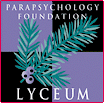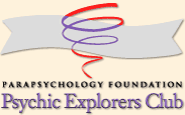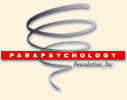 |
 |
| Examining Current Challenges in the Field of Inquiry into the Paranormal By Peter Ramakers Koestler Parapsychology Unit Department of Psychology University of Edinburgh Defining parapsychology is not easy. The word is derived from Greek: “para” meaning “alongside” or “beyond” and psychology meaning “study of the soul”. Whether or not the discipline lives up to this name is examined in this essay, yet in practical terms, we could say that parapsychology is the scientific study of ostensibly paranormal phenomena. And it is in the word scientific that one of the challenges for the field lies, for in practice, the emphasis on the scientific method, and the frame of mind that often comes with it, hampers the integration of this highly interdisciplinary field. Employment of the scientific method should be done from an overall framework that incorporates, rather than precludes, the phenomena under study. Unfortunately, use of the scientific method is often implicitly bound up with the philosophy known as materialism or reductionist materialism. Every researcher studying the paranormal is free to hold their opinions, whether they favor materialism, dualism, pluralism, or any other philosophical stance. This, in theory, should make no difference as to the application of the scientific method and the ability of a field to be working in relative unison. However, in practice the use of the scientific method and its implicit philosophy divide the field of parapsychology. Indeed, the name parapsychology was established to distinguish between what had until then been known as psychical research and the then new way of studying paranormal phenomena using more stringent procedures complying with the scientific method. Although there is dialogue between the quantitative and qualitative approaches, there is no unity, and my point is this: the division of the field will continue to hamper progress as long as parapsychology insists on being accepted by, and staying within, strictly academic bounds. This statement can be seen as being highly antagonistic to the very foundations of parapsychology, and thus not helpful in facing its challenge. Yet the meaning of this statement is not as deconstructive as it sounds. To make this clear I need to explain why I believe the insistence on academic acceptance is the main challenge of parapsychology. In order to do this, the issue of inquiry into the paranormal needs to be put into a broader historical perspective. The study of paranormal phenomena is as old as mankind. The stream of research under discussion — parapsychology — is merely part of the on-going development of human inquiry, and a very recent one, it should be remembered. Long before the scientific revolution people have observed and recorded events that took place in the world around them, as well as within themselves. Several millennia of observation have resulted in highly complex systems of thought, carefully mapping the structure and dynamics of the psyche or soul. Processes that nowadays would be called paranormal are integral to these systems. Modern day parapsychology is merely a branch of inquiry, based on the scientific method. It is not the only one, and considering the nature of the phenomena, perhaps not the best one. The scientific method should be applied for what it is: a method, not a goal in itself. If we consider for a moment the complexity of the natural world in which we live, and indeed the complexity of our own minds, we should not be surprised that the application of statistics to such subtle processes as those of the psyche can only yield slow and fragmented progress. Perhaps one should even consider the possibility that the scientific method can never explain the psyche entirely. Why then, do parapsychologists make such an effort to be accepted by mainstream science? Mainstream science is entirely based on materialism. Discussions about the nature of reality are relegated to the philosophy department. And even if a researcher questions the effectiveness of the method, the stream of in-coming data quickly reassures him of the order and predictability in the world. Study of the paranormal is different. It is the study of phenomena that, even after careful consideration of normal explanations, remain unexplained. This is an indication that the scientific method may be inappropriate. Therefore, by insisting on isolation from other methods of enquiry in order to be included in the academic establishment parapsychology is holding back real discovery. This is the paradox of parapsychology. It should be noted that this insistence on isolation is an implicit process, rather than an explicit statement or mission. Explicitly, parapsychologists might argue for inclusion in the academic world, as this is expected to enhance funds and thus promote inquiry. Furthermore, many parapsychologists would explicitly welcome contributions from psychical researchers, mediums and mystics. Yet implicitly the desire for academic acceptance causes a rift from other methods of enquiry. This can be witnessed clearly at the conferences at which parapsychologists and psychical researchers present their work. Apart from segregation from other methods of inquiry and with it, I argue, segregation from the subject matter itself, another effect of the reliance on the scientific method (reductive materialism) and the desire to be included in mainstream academia can be observed. This is the phenomenon of researchers who present themselves as parapsychologists while not addressing the issue of the paranormal. While inquiry into the paranormal must be accompanied by a critical evaluation of normal explanations, these approaches should not become more than a safety net or launching pad from which to start further inquiry into the phenomena themselves. In summary, the challenge of parapsychology will be to resolve the paradox and incorporate any method of inquiry that recognizes the scope of the subject matter. It has not been my intention to devalue the scientific method in general, but to put it in its place. Any serious inquiry into the paranormal must acknowledge the limitations of the scientific method, and incorporate knowledge from other methods and fields. There have been, and still are, many parapsychologists who happily do this, but the there is a tendency in the field as a whole towards accommodation to established academia. It has also not been my intention to devalue the contribution of the scientific method to research into the paranormal specifically. On the contrary, empirical evaluation of psychological and paranormal phenomena should, in the long run, reveal patterns that exist in reality (although these patterns may not be the full picture). However, parapsychology has not yet reached a sufficient level of maturity to become a discipline that does not need academic approval. The lack of funds and resources are a reflection of this disapproval, but accommodation and dilution of the subject matter are not the way forward. Instead, parapsychology should take the lessons learned from applying the scientific method and move towards full re-integration with psychical research and adopt a more encompassing philosophical framework in which reductionist materialism is an option rather than starting point. To propose in detail solutions to these problems is beyond the scope of this essay, and indeed beyond my knowledge. Yet what I can do is offer the suggestion to redirect effort from becoming accepted by mainstream science into the expansion of existing research centers, like the Rhine Research Center and the Institute of Noetic Sciences, and the creation of new centers in Europe. Ideally, such centers should be able to offer permanent research positions and full-time education. This education would not only be in experimental parapsychology, but would cover a wide range of topics from physics, philosophy and psychology to mythology and mysticism. Perhaps in time these institutions would be not unlike the Platonic Schools or the centers of learning in Safed. Parapsychology is in fact meta-science and should be approached accordingly. The lessons learned from adopting the scientific method should be embraced into a new discipline. This discipline would concern itself primarily with matters of a psychic nature and would seek to integrate and expand upon knowledge gathered over millennia. In effect, the new discipline would not be science as we know it, and perhaps parapsychology should not be its name. *********** To read a brief biography of Peter Ramakers, go to the “Previous Recipients” page of the Coly Prize section of the main Foundation website. For the Index of Archived Essays click here. |
 |

|
 www. parapsychology. org |
||